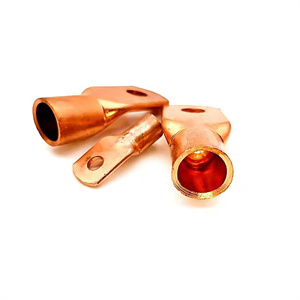The commonly used materials for terminal connectors mainly include metallic materials and non-metallic materials.
Among metal materials, copper, aluminum, and steel are common choices. Copper has good electrical conductivity, corrosion resistance and plasticity, so it is widely used in the field of electrical appliances, such as home appliances, automobiles, ships and instrumentation. Common copper terminals include brass, phosphor bronze, beryllium bronze, and copper alloys. Aluminum terminals are lighter, stronger, and less expensive than copper terminal connectors, and are commonly used in high-voltage appliances, towers, and wires. Steel terminals are hard and wear-resistant, making them ideal for applications that require high strength and wear resistance, such as cutting machines, generators, and steel equipment.
Among the non-metallic materials, plastics and ceramics are also common terminal connector materials. Plastic terminals are usually made of materials such as nylon, polypropylene, etc., which have good insulation and corrosion resistance, and are often used in low-voltage circuits. Terminal connectors have excellent insulation and high temperature resistance, and can ensure no expansion and non-bursting even at high temperature and high pressure, so they are widely used in high-voltage cables, power equipment and other fields.
There are a variety of materials commonly used in terminal connectors, and the specific choice should be considered based on factors such as use case, performance needs, and cost.
Copper: Good conductivity and thermal conductivity, common choice.
Phosphor bronze is commonly used in the manufacture of high quality terminal connectors because it has high strength and good flexibility to maintain good contact performance after multiple plugging and unplugging.
Brass: Good conductivity and relatively low cost.
Commonly used in terminal connectors that are cost sensitive but not very performance critical.
Aluminium: Light weight and certain conductivity, used in some applications where weight is required.
In some aerospace or portable equipment.
Stainless Steel: Excellent corrosion resistance and strength.
Suitable for harsh environments or applications requiring high mechanical strength, such as terminal connectors in industrial automation equipment.
Engineering plastics: such as nylon, polycarbonate, etc.
It is used for insulation part to provide good electrical insulation property and mechanical strength.
In some waterproof terminal connectors, the plastic housing effectively protects against moisture ingress.
